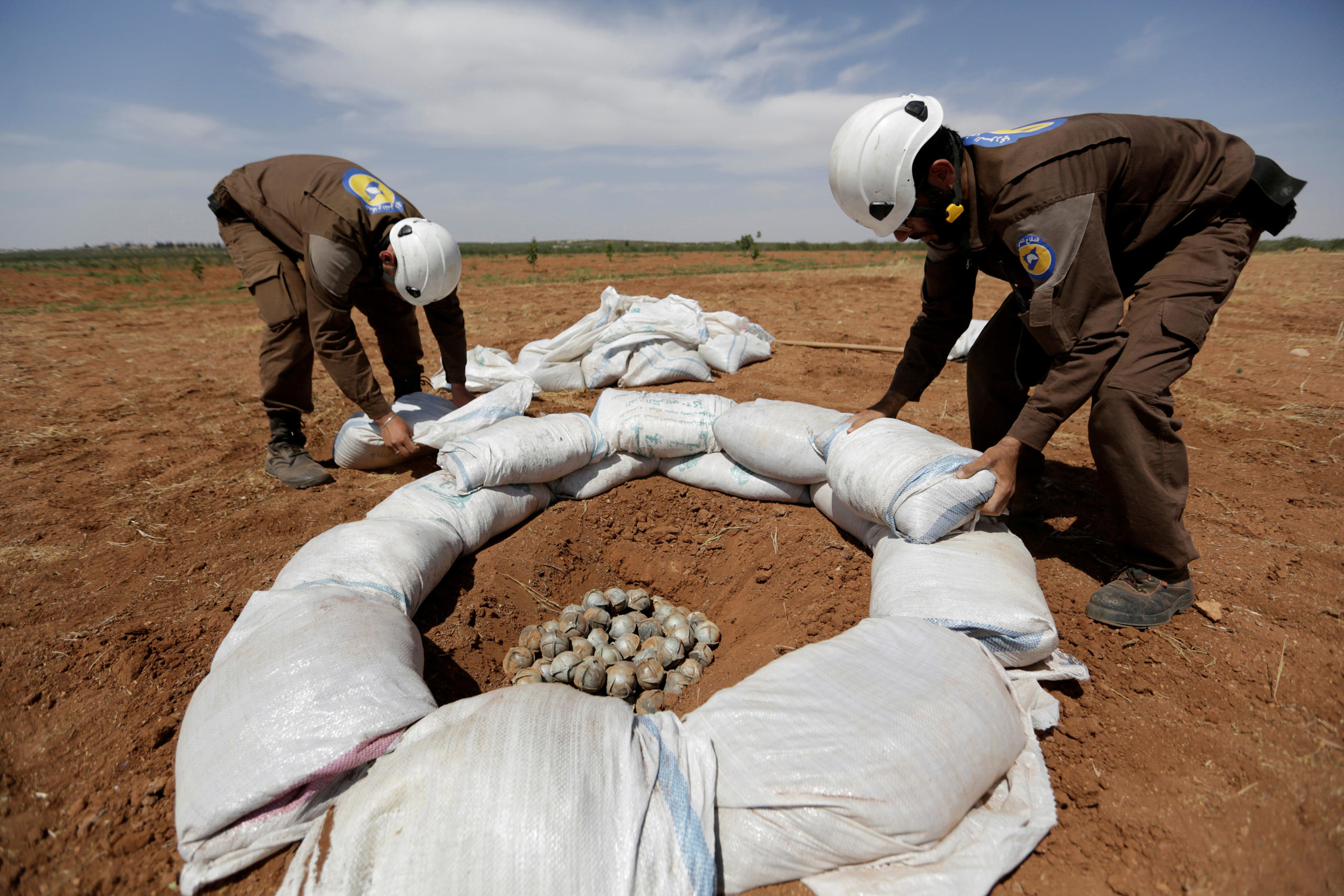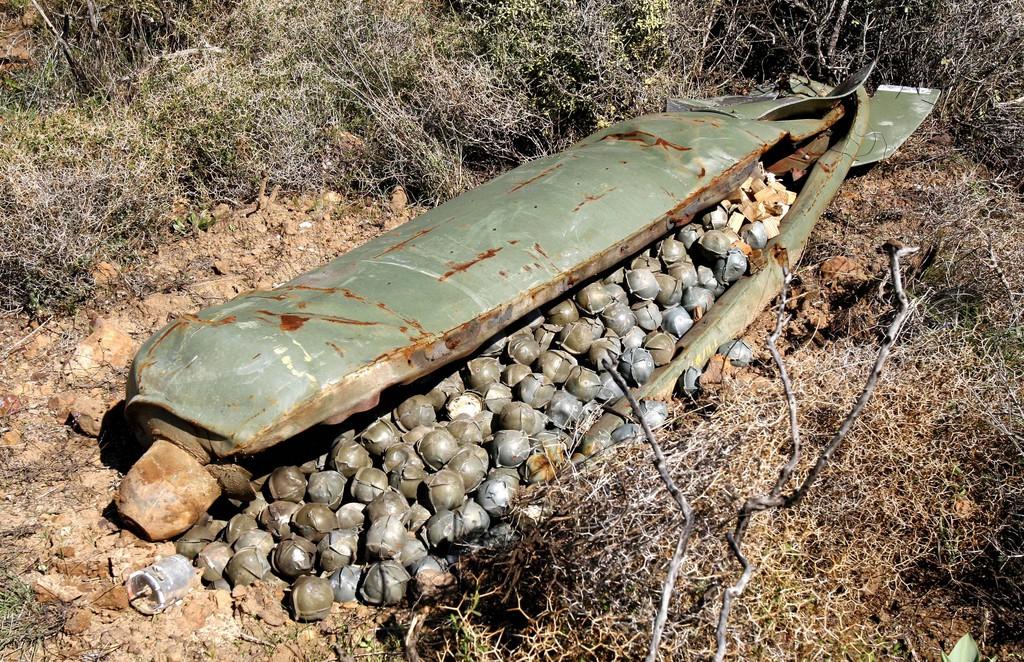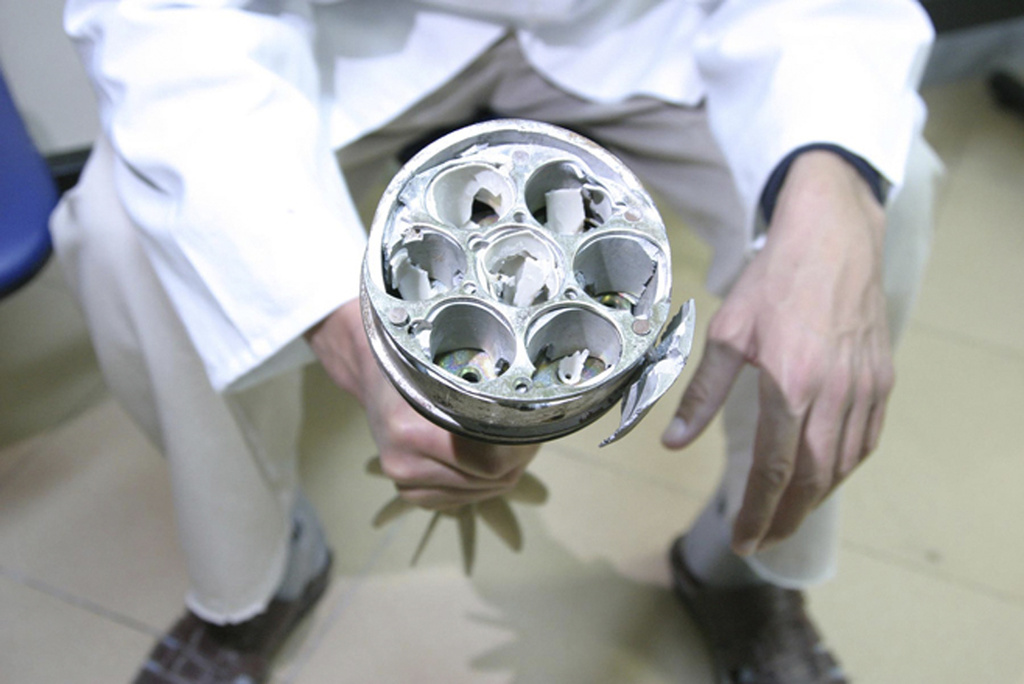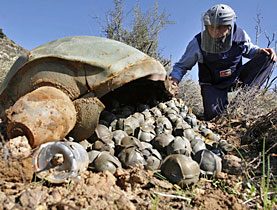Cluster bombs remain deadly threat despite treaty progress

‘Remarkable‘ progress has been made eradicating cluster bombs worldwide during the short period that a global treaty has been in force, say Swiss officials. Yet the deadly munitions continue to be used in conflicts like Syria and Yemen. Switzerland is currently destroying almost 202,000 it built up from 1988 to 2004.
According to Sabrina Dallafior, Switzerland‘s ambassador in charge of disarmament issues, the Convention on Cluster MunitionsExternal link, which came into force in 2010, is ‘starting to make a difference on the ground’.
Dallafior is heading a delegation of Swiss officials who are taking part in an international review of the convention this week at the United Nations in Geneva.
In her address on Monday, Christine Beerli, vice president of the Swiss-run International Committee of the Red Cross (ICRC), echoed Dallafior’s main message: “The convention has been a remarkable success in the short time it has been in force. Two million cluster munitions have been destroyed, hundreds of square kilometres of land have been cleared. And state parties with cluster bomb victims are providing assistance in accordance with the treaty requirements.”
Since August 2015, five more countries – Colombia, Iceland, Palau, Rwanda and Somalia – have ratified the convention, while Cuba and Mauritius acceded. A total of 119 states have now signed up.
However, important players like the United States, China and Russia have not signed up to the treaty.
And in 2015, cluster bombs killed 417 people, more than a third of them children, the Cluster Munition CoalitionExternal link activist group said on Friday, adding that the actual number of casualties was likely to be much higher. Most casualties in 2015 were in Syria (248), followed by Yemen (104) and Ukraine (19), the coalition said in a report.
There is evidence that Russia has been behind a significant increase in the use of cluster bombs in Syrian opposition-held areas since September 2015, say campaigners. Russia has repeatedly denied using cluster bombs.
For the deadly munitions to be eliminated once and for all, officials are calling for states to prioritise measures to implement the treaty, and greater transparency and universal ratification. A Dutch foreign ministry official on Monday suggested setting a target date of 2030 to complete the clearance and destruction of cluster bombs and stockpiles around the world.
Swiss stockpile
Switzerland External linkratified the treaty in July 2012, four years after it was launched, after a lengthy national consultation process.
In accordance with the convention, it is focusing efforts on destroying a large stockpile of 201,895 cluster munitions, comprising four different types built up between 1988 and 2004. The munitions were purchased from the United Kingdom and Israel and reassembled in Switzerland, where special features were added to make them more reliable, according to the Cluster Munition Coalition.
Swiss officials confirmed on Monday that between 2010 and June 2016, Switzerland had destroyed 76% of its stockpile, with the bulk eliminated from 2014 onwards. It currently sends around 5,700 projectiles every six weeks to a disposal firm based in Germany. The remaining stock should be completely destroyed by the end of 2018, well ahead of its January 2021 deadline.
“Switzerland is on track. It’s going well,” said Mary Wareham, Human Rights Watch (HRW)’s arms advocacy director and editor of the report. “They are working through in a systematic and thorough way as you would expect from Switzerland.”
Last vestige
According to official reports, Switzerland has never used or exported cluster munitions. And they have never fired them in Switzerland, even for training purposes.
Why would a seemingly ‘neutral’ country like Switzerland, with its strong humanitarian tradition need to have cluster bombs? The Swiss stockpile dwarfs those of similar-sized countries like Austria, Denmark or Norway.
Wareham said she was not surprised. “All countries have their own reasons for having acquired or manufactured cluster munitions. It was a perfectly legal thing to do until awareness was raised,” she said.
During the treaty ratification debate in the Swiss parliament in 2012, some conservatives opposed the move warning that it could undermine Switzerland’s defence capabilities.
The Swiss cluster bombs stockpile appears to be another last vestige of Switzerland’s defence policy to protect Switzerland during the Cold War era, when there were fears of an attack by Warsaw Pact countries.
“In 2012 when Switzerland decided to ratify the Convention, it was considered that cluster munitions wasn’t needed anymore for legitimate defense needs,” said Vincent Choffat, a policy and military advisor based at the Permanent Mission of Switzerland to the UN in Geneva.

In compliance with the JTI standards
More: SWI swissinfo.ch certified by the Journalism Trust Initiative





You can find an overview of ongoing debates with our journalists here. Please join us!
If you want to start a conversation about a topic raised in this article or want to report factual errors, email us at english@swissinfo.ch.